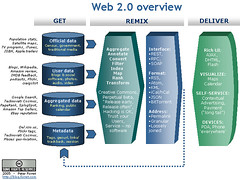It’s so cool to be anti-Web 2.0
12 Nov 2005Not only that, the very 2.0 in Web 2.0 seems carefully crafted as a way to denegrate the clueless “Web 1.0” idiots, poor children, in the same way the first round of teenagers starting dotcoms in 1999 dissed their elders with the decade’s mantra, “They just don’t get it!”
I’ll do my part. I hereby pledge never again to use the term “Web 2.0” on this blog, or to link to any article that mentions it. You’re welcome.
(from joelonsoftware.com)
I was really bothered by this statement for 2 reasons:
- Why does something have to be either the answer to all questions or completely irrelevant? Isn’t there like a really interesting grey zone in the middle? Web 2.0 is not gonna make everyone rich, it is not gonna change every aspect of our lives, but that’s doesn’t mean it is to be dismissed and never talked about. Because it is a collection of technologies and principles and ways-of-working, and as such not trivial to grasp, it might not be clear from the first instant if it might have implications on the way you do business or not (see Dvorak quotes below).
- It’s so easy to be completely negative about something. If you’re positive, it might come over as kissing *ss, but dissing something really makes you look cool (sometimes “teenager cool” with rude language like Go Flock Yourself). If you’re wrong, no one bothers coming back to say “told you so”. I even feel Joel is doing the exact thing he claims to hate: distancing himself from the rest, so they feel silly. “Web 2.0? Oh, that is só summer of 2005!”

Why do I like Web 2.0? I see people enthusiastic again. I see brains working, creativity being appreciated and people setting up new initiatives. These are not people walking round with $$ in their eyes and an “I ♥ I.P.O.” tattoo on their shoulder. But I can tell you it’s more fun to work in IT now than it was 5 years ago.
I predict that people like Joel, who intentionally distance themselves from a bottom-up movement like Web 2.0 because it is fuzzy and incomplete, are in fact labeling themselves as out of touch with the new segment for whom such terms make sense, if only as a means of self-identity. The fact that they don’t make sense to other, older people and outsiders is part of the appeal. It worries me that Joel sounds like a troll here, like PC Magazine’s Dvorak, howling at whatever newfangled stuff is coming down the pike. The message from curmudgeons like that is that everything important has already been invented, catalogued, and understood.
(from corante.com)
Me too, I was reminded of the difference between two posts of John Dvorak in PCMag:
This is followed by a manic period where the new idea is extolled as the next big thing, and nutjobs run around like dogs released from the kennel yapping about how great it is. In this fashion, we have been introduced to podcasting-the next big thing. Too bad it’s a kludge that doesn’t work as advertised unless you have a Macintosh and an iPod.
from Podcasting: Not Ready for Prime Time (Oct 2004)
and
There is no doubt in my mind that podcasting is not only here to stay but will also shortly threaten established media broadcast systems. It’s not so much that they will all be destroyed by homebrew networks, but podcasts will be taking away just enough listeners to be a major concern
from Podcasting: The Next Big Thing (Jun 2005)
That sounds a lot like: I dont get it, so it’s crap and Oh, now I get it, it’s brilliant!.